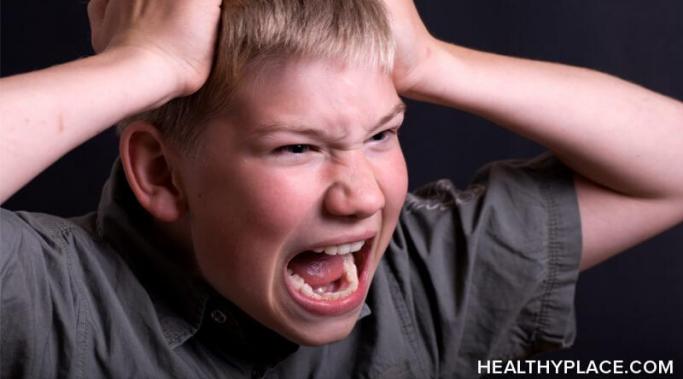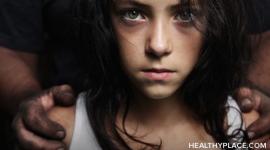Mood Disorders in Children
Online Conference Chat with Trudy Carlson About Mood Disorders in Children
Trudy Carlson author of several books on depression and suicide, including "The Life of a Bipolar Child: What Every Parent and Professional Needs to Know," is the guest speaker.
David is the HealthyPlace.com moderator.
The people in blue are audience members.
David: Good Evening. I'm David Roberts. I'm the moderator for tonight's conference. I want to welcome everyone to HealthyPlace.com. We have only been open for 2 weeks. This is our first online conference. Our conference tonight is on "Mood Disorders in Children". Our guest is Trudy Carlson, author of several books on depression and suicide including The Life of a Bipolar Child: What Every Parent and Professional Needs to Know. She holds a masters degree and has taught many classes on the university level including child, adolescent and developmental psychology; the psychology of the exceptional child and personality and mental hygiene. Her son suffered bipolar depression, ADHD (attention deficit hyperactivity disorder) and an anxiety disorder, and while still a teenager, died by suicide.
I want to welcome you to the HealthyPlace.com site, Trudy. I'm wondering, with all the education and training you had, were you surprised by your son's tragic death?
Trudy Carlson: Like every other parent, I didn't expect my son to die. I knew he was very ill, but he was seeing a good psychiatrist and we assumed he would eventually be well. Depression is like every other disease and unfortunately, some people, who are very seriously ill, die from their illness.
David: Your son had a mixture of mood disorders- bipolar, anxiety, ADHD. What are the most important things a parent needs to be aware of when dealing with these types of disorders?
Trudy Carlson: Ben said that my understanding that it wasn't his fault was the most important thing for him. Bipolar kids can have a number of social problems and learning problems which makes school very difficult.
David: I think it's a pretty common feeling among people who suffer from psychiatric disorders that somehow they are to blame for what's going on. And that furthers their depression. What can be done to help bipolar children through these social and learning difficulties?
Trudy Carlson: Right, depression in children is marked by low self-esteem. Because they have difficulty with concentration, they often have trouble achieving. This further hurts self-esteem. Children need support. If they can get it from their parents and their school, it helps a lot. But this means that parents and teachers need to learn as much as they can about childhood depression. I am a strong believer that since depression and anxiety as so common among children and it interferes with school achievement, all children should undergo a self-completed screening twice a year.
David: Trudy, here are a few audience questions:
Noele: What advice would be on the top of your list to tell our kids in their hours of need how to deal with the lack of a social life?
Trudy Carlson: That is a tough question. My own son often felt very uncomfortable unless I was there to help him. If the youngster can get medical help that reduces his depression, he will gain self-esteem and this should help. I think the most important thing is to give him a sense of hope. I think many of these children need to be in a group where social skills are taught. Parents may have to find other parents to set up such a group.
lotsoff: How much should the parents push the schools to mainstream their "special" children?
Trudy Carlson: I don't know if all mainstreaming works that well. I think that the parents and the child need to think about what is right for them. Since anxiety is a common disorder that accompanies both unipolar and bipolar disorder, if a mainstream classroom is too anxiety-arousing for the child, it isn't clear that it is helpful.
specialk: Miss Carlson, I have a three-year-old grandson that is having problems at school and to me is exhibiting signs of depression and or bipolar. What should be done at this point?
Trudy Carlson: Many depressed children do well in regular classrooms when they have a teacher who understands they need support.
lotsoff2: Bravo, bravo!!! So many parents want for themselves and miss what is best for their child...on the mainstreaming issue.
Trudy Carlson: If you can find a doctor who will listen carefully to all of your concerns, you have taken a major step forward. Since most bipolar children have the symptoms of ADHD and, in fact, have more symptoms of ADHD than kids who have this disorder but aren't bipolar, this should help all of you in the process of diagnosis. Mood stabilizers, such as lithium and anticonvulsants, are often prescribed. You may need to go to a specialist to get a final diagnosis.
David: Not only is it tough on kids Trudy, but for parents who have children with mood disorders it can be extremely trying. Did you find that so in your personal life? And what would you recommend to parents here tonight to help themselves deal with the stress?
Trudy Carlson: Everyone needs support. Families of children with bipolar illness need the same things that families with children with diabetes need. They not only need medication, but they also need to learn as much about the illness as possible. They also need the support of others who have this condition. They need to structure their lives to avoid situations that make their illness worse. They need to be careful about diet and exercise. Most of all, they need to know that they are not alone, that this illness is not their fault. And there is nothing like talking with others who have been there. One more comment. Anything that parents can do to reduce the stress in their lives, the better. You don't have an easy life. Don't expect so much of yourself.
David: Here are some more audience questions:
Marile: I have bipolar and my stepson is at least ADHD. He just got kicked out of school for behavior problems. I know that most of his problems were related to the medicine, but our family is still disrupted! We are going to go to a new medical doctor to see what she can do for him. We are also going to therapy for anger management. Do you have any other suggestions?
Trudy Carlson: My husband has bipolar, but we did not know this for some time. He is bipolar II, so his symptoms were predominantly depression and the hypomania was very mild. So, we did not understand what was going on with our son for some time. I realized that he had a learning disability, but the school system did not. This was back in the 1980s when schools didn't know anything about ADHD. Now, all of us would like to teach the school systems about bipolar. If your stepson has most of the many symptoms of ADHD, one wonders if he doesn't have bipolar Once he is placed on a mood stabilizer, his behavior will improve.
I don't know if many teachers understand that bipolar kids also often have symptoms of conduct disorders and oppositional defiant disorder. My own son was mildly oppositional. I think I was one of the few people who recognized this.
StarFire: Trudy, I don't have a problem with academics. I'm 17 and almost a sophomore in college. However, I have very great problems with the social aspect. It is not hard for me to meet people online and I have a great personality but I'm almost afraid to be around people in real life. Do you have any suggestions as to how I can go about being with others? It gets very lonely and that only depresses me further.
Trudy Carlson: This social issue is a terrible problem. In the book I wrote on Learning Disabilities, I suggested the formation of a social club for kids. They need training and experience in social situations. Adults have found support groups to be so helpful. I think it is about time that kids experience that kind of support. Bipolar kids have so many symptoms in common with ADHD kids that a group for ADHD would be an appropriate place for them.
David: Here's an audience comment relating to bipolar symptoms and then another question:
Patt: Trudy, that's why I think your book is so important. Teachers (and parents) need to recognize the symptoms and suggest treatment, rather than everyone thinking: "oh, that's just Johnny!"
David: If you are interested, you can purchase Trudy's book: "The Life of a Bipolar Child: What Every Parent and Professional Needs to Know".
samsmom: My 10-year-old son wants to know how he can handle rages at school.
Trudy Carlson: Dr. Burns has a wonderful workbook called: Ten Days to Self Esteem. In that workbook, you will learn many cognitive behavioral techniques that will help you.
David: Here are a few more audience comments relating to our conversation tonight:
Dandy: I've had good results with home-schooling my bipolar step-daughter. But it's really hard to be 24/7 "on duty" as mom and teacher.
Noele: Yes, but even with special school and medication some children feel alone and almost like they hear someone whispering that they are different and crazy. They want to fit in, they have the knowledge of behavior issues yet lack the skills to carry them through. Then what?
David: Here's a question, Trudy, about changes in hormones as your child reaches puberty:
monkeysmom700: Due to the intense counseling my 12-year-old son has been through in the past year, he seems miles ahead of his peers in dealing with adversity. He is fairly stable at this point, almost to where we forget he has bipolar until he has a swinging day. As he heads into the teen years, should we expect the hormonal changes to amplify his mood swings?
Trudy Carlson: I believe that most youngsters who become bipolar experience this at the age of 15-20 year old. Hormones do play a significant role in the onset of depression in girls who didn't experience depression until puberty. If you son is on mood stabilizer medication that is working well for him, he may be very fortunate to avoid serious swings in adolescence. But since the field of child and adolescent psychiatry is still so new, I don't know of any studies that have looked at the question of increased problems for children during adolescence. The big concern would be to keep him on any mood-stabilizing medication that has worked well for him in the past.
worn_out: As a father of a 25-year-old daughter who has had type I diabetes since age 6, I know that most children care little about their illnesses. They just want to be like everyone else. It was difficult to keep her on her insulin, diet, etc. How do you manage children with mood disorders?
Trudy Carlson: Support groups that confront the issue of medication compliance are very important. I have a nephew and niece who have been diabetic since they were extremely young. My nephew says that sticking to the diet is tough. I won't lie to you and say that there is any magical answers to what is a very difficult problem.
David: An audience comment, then another question:
Noele: OK, WE as parents need to find any resource to set up our own group therapy groups of social skills even if its making our kids counselors do this I have been working on this for some time and I will achieve this it EXACTLY what my son needs and maybe your sons or daughters so Parent UNITE now and lets get on it in schools AEA and in our community.
Victoria: I have a 14-year-old boy that was diagnosed six years ago with ADD. When the medication didn't work, I went from doctor-to-doctor trying to convince them that it was more likely to be depression because of the family history. But doctors are reluctant to prescribe antidepressants for children. Why is that?
Trudy Carlson: If your son has bipolar illness, he will need a mood stabilizer rather than an antidepressant. Doctors would be hesitant to prescribe an antidepressant because if he is bipolar, it would make him worse. But if he is clearly not bipolar, and there is no history of bipolar illness in your family, then you might ask if he would consider using a medication like Wellbutrin. That is an antidepressant that has been used to help some people with ADHD. But please remember that I am not a doctor and he needs to get a doctor's opinion. Also remember that if he should be bipolar, that medication may not be helpful.
David: I also want to mention here, there's a big controversy going on right now about doctors over-prescribing psychiatric medications like Ritalin and Prozac to young kids...as young as 2-5 years old. And the pharmaceutical companies haven't done any testing in that area. So, as a parent, it's very important to watch out for that. It is very difficult to properly diagnose children at that age.
Trudy Carlson: Yes, unless the doctor first rules out bipolar illness, Ritalin and Prozac could make the child's symptoms worse.
David: Audience responses to the medication issue:
Marili: Good point David, it is so difficult to know if some of the children's behavior is "normal" or just plain ole rebellion!
Victoria: But no one seems to actually make a diagnosis. He is on Effexor right now, which is the same as everyone else in the family.
specialk: They put me on Wellbutrin for bipolar as well as Zoloft and Klonopin.
Funny Face: Trudy, is it common for more than one child in a family to be bipolar?
Trudy Carlson: I went to the bipolar conferences that are held in Pittsburgh every other year. At one conference, I met a lady whose mother and father were both bipolar. In that case, several of the children inherited the condition. If only one parent is bipolar, the occurrence is approximately 17%. Some of the time, children will have another form of depression.
David: If you are interested, you can purchase Trudy's book: The Life of a Bipolar Child: What Every Parent and Professional Needs to Know.
Lou1: How do I convince my 12-year-old daughter that she needs to be in a special class? She argues this with me all the time. We've tried mainstreaming, it's just too much for her to handle.
Trudy Carlson: I wonder if your 12-year-old daughter would be willing to have some sort of compromise. Would she be willing to be in the special class some of the time and be mainstreamed at other times? Or have you tried this already?
Lou1: Trudy that has been tried already. It didn't work out.
David: Well, I know it's getting late and you're on the east coast.
Trudy Carlson: I can't tell you how much fun it was. I enjoyed the conference.
David: I appreciate you being here tonight. We had about 100 people come in and out of the conference and I think we all learned a lot.
Noele: Trudy, thank you!
Trudy Carlson: If you ever want to chat some other time, I will be happy to come back
David: We will definitely have you back again. Thank you for being our guest and I want to thank those of you in the audience for coming tonight and participating.
Marili: David, I think this was very successful! I'm glad I was not working tonight! Thanks for your time too!
Victoria: Thank you Trudy.
specialk: Good night all and I will return. Thanks Trudy and David.
David: Good night everyone.
Disclaimer: Please note that HealthyPlace.com is NOT recommending or endorsing any of the suggestions of our guest. In fact, we strongly encourage you to talk over any therapies, remedies or suggestions with your doctor and/or therapist BEFORE you implement them or make any changes in your treatment or lifestyle.
APA Reference
Staff, H.
(2007, July 23). Mood Disorders in Children, HealthyPlace. Retrieved
on 2024, November 20 from https://www.healthyplace.com/parenting/transcripts/mood-disorders-in-children




